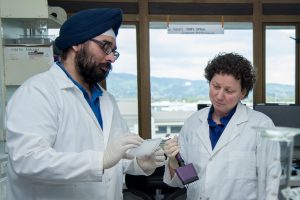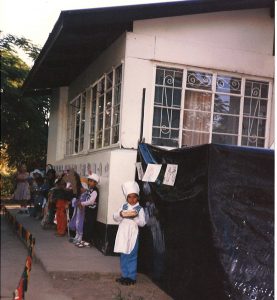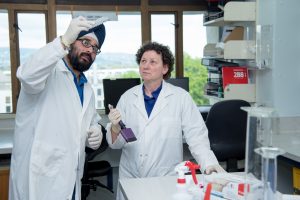Pharmacogenetics
We are all aware that our genetics play a part in our likelihood of contracting certain diseases. The combination of genes we inherit from our parents determines what diseases we are susceptible to. Are you aware that our genetics also determine our reactions to drug treatments as well? This fascinating field of medicine is called pharmacogenetics, and it looks at how our genes affect our responses to medication and the associated side-effects of medication.
Research Fellow Dr Simran Magoo has been interested in pharmacogenetics for the last 10-15 years and has a strong interest in drug-induced adverse drug reactions. Simran explained, “I just find drugs interesting—How you could take a medication, and how I could take the same medication, and even if the dose was tailored towards our respective body weights, you could have a side effect, and I could not.” Simran’s current research is focused specifically on mental health medications and the reasons why there is such variability in which medications have efficacy for each individual. Simran explained, “a lot of people are prescribed antidepressants…and a lot of people report, either that it does not work for them, or that they get some horrible side effects.” In this case, usually the best (and only) option for the patient is to try successive prescription medications until they settle on one with some efficacy for their condition, and minimal side effects. The issue with this is that the process of changing medications can often compound mental health conditions. There is a drug called Venlafaxine for example, (an SSNRI used to treat depression among other things), which has great efficacy for some, but not for others. For those that report low efficacy, the withdrawal process involved in coming off the medication can be traumatic, making it difficult to stop and move onto the next medication, and thus make recovery a lot more difficult for the patient.
Simran explained how his research is attempting to improve on this process. “We have been looking at recruiting people (who take prescription medications for mental health conditions) into our various studies and seeing: is a person’s genetic makeup associated with specific side effects they get, or, associated with whether the antidepressants work or not?”
Simran noted that while medication is a great option for those suffering from mental health conditions, it should not necessarily be the first option. Simran explained “I think antidepressants should probably not be your first line of thought. I think there are various other therapies, cognitive therapy, or group therapy, or just talking to someone. It may sound bizarre coming from someone who has studied pharmacology, and usually, would probably be pro-drugs. But I think for mental health, drugs help. They definitely help, but I think they should probably be one of the last resorts.”
Journey to Genetics
Simran has traversed a fascinating path to conducting his research with Genetics Otago. Simran was born in India and moved to Africa with his family at about six months old. His father, a mechanical engineer, was an expatriate in Zimbabwe. Simran and his family spent seven years in Zimbabwe, before moving on to Botswana. As a result, Simran speaks Hindi and Punjabi, and some Setswana, the language of Botswana. Recalling much more of his time in Botswana than Zimbabwe, this is where Simran completed the majority of his schooling and remembers it as a great place to grow up, but commented it would be very hard to compare to New Zealand. During this time, Southern Africa was a great place to be as the economy was thriving, and as his father was an overseas employee, they enjoyed some perks such as entrance to the best schools. Although he commented that after attending an international school for two years, he “actually did not like it much,” explaining “I preferred the local public schools. I suppose I found the international schools pretty snooty, and full of rich kids. Our family, we are not super rich, and I suppose I just did not fit in. I just found going to regular school was more my kind of thing.”
Recalling one experience with a particular teacher that stuck with him, Simran says “I suppose back in those days there used to be a bit of segregation or racism, so to speak. This may sound really wrong, but it actually happened. They put all the white kids in one class and put all the non-white kids in another one. I was obviously put in the other one. But the teacher said to me “look, you may see a big difference between that class and our class,” but I think she said something about God’s brain, like “your brain is no different than theirs. Do not let that get you down. What they are going to learn, is exactly what you are going to learn, so there is going to be no difference.” So yeah, I suppose that was an interesting time.”
As Simran approached high school graduation, his family was looking at possible countries to migrate to next and had applied for residency in a few countries, including Australia and New Zealand. He recalls the New Zealand residency came through and his dad one day asking “Simran, do you want to go to New Zealand? Because we have applied for residency and it just came through, and you have almost finished year 12.” Simran explained “And that is basically how I ended up in New Zealand. He gave me my passport, gave me a bit of money and he was like, “go check it out!”” After being accepted into Auckland University, Simran visited Dunedin and decided the small city was much more his kind of pace, and subsequently began studying health sciences there. Simran joked “I think, not everyone, but most people want to be a doctor at some point in their life. I think I wanted to, or maybe my parents wanted me to, but I was not sure. But, I did not get into medicine. However, I came across the Department of Pharmacology, which seemed really interesting.” He went on to complete a bachelor’s degree in pharmacology, followed by a postgraduate diploma, masters and PhD. Simran’s family soon joined him in Dunedin. He explained “Basically, Dad said, ‘this is the day that we are going to pack up, and we are also going to come,’ he said, ‘Just look at a few houses.’ I had a few houses picked out, and when they came, we decided on one. We have been living in that house since then.”
Simran recounted an amusing story from his first job in New Zealand, working as a computer software salesperson. When he applied for the job, he had thought it would be in a computer store, but it was a door-to-door salesman role. This was in the early 2000s when not many people had computers in their homes. His work had travelled to Gisborne to do selling there, and Simran was relatively new to New Zealand. He inadvertently got invited into a Mongrel Mob house (joking that he was lucky to be wearing red that day). The place was messy and cluttered, but they were interested in purchasing a computer setup. He ended up getting the sale and a decent commission, and only later did he come to realise what the mongrel mob was!
Routine Genetic Cancer Screening in New Zealand?
In discussing his research in more detail, Simran explained that pharmacogenomics or genetics should ideally be a crucial part of the New Zealand healthcare system. This would mean that prior to the prescription of any medication, a patient should have a basic pharmacogenetic screen. This could provide basic predictions such as whether the patient is likely to have an adverse reaction to the drug, and whether the drug will have any efficacy at all. The benefits of this could be huge, we would have significantly less wasted medication, faster recovery times, and less adverse drug reactions. Simran explained his frustrations that this concept has not been taken seriously, asking “why is it that a very basic test like this is being held back?”, or “what do I need to do to actually convince people that this should be in routine every day clinical care?”
There is very good research for certain drugs that says, “if you have these specific genetic variations, you are likely to get these adverse drug reactions”. There are some very clear-cut examples where, if you have a specific variation, you are almost 90% likely to have a physical reaction. There is currently one medication in New Zealand that, prior to prescribing it, doctors have to do a genetic screen in their patient. However, this drug is used in antiretroviral therapy in the treatment of HIV, and thus is not commonly prescribed in New Zealand. Coming back to prescription antidepressants, Simran feels that “if you were to test for variation in the genes prior to prescription, you could most likely prevent people experiencing side effects. I would say there is enough evidence out there in the literature, as well as in some of the studies we have done, to show that if you have certain genetic variations, you actually have a higher risk of getting side effects.”
Simran gave another interesting example that nicely demonstrates the importance of pharmacogenetics. A proportion of the population contains a mutation in their CYP2D6 gene. This gene is responsible for producing the Cytochrome 2D6 enzyme, therefore those that have a mutation in the gene cannot produce the enzyme. The enzyme is used in the process of breaking codeine down into morphine, a vital step for the codeine to provide effective pain relief. As the enzyme that facilitates this process is not produced in certain people, any codeine they take will never be converted to morphine. You can be prescribed as much codeine as you want, it will not work for you. To put it bluntly, Simran explained “there are millions of doses of codeine that probably get dished out in New Zealand every year, and it is basically the same as just throwing them down the toilet because they are not doing anything for the patient!” Simran then explained “I am one of those people. I have no 2D6 enzyme activity. So, when I had knee surgery, I told the doctor, look, please do not give me codeine or Tramadol or anything like that because it is not going to work for me.” His doctor thankfully understood and accepted this and prescribed alternate pain relief options. Some doctors though are not even aware of this, Simran explained: “I have colleagues who have said similar things to the doctors and the doctors have denounced it or said no, it is not possible.” Simran believes it would not be an unrealistic task to provide genetic screening before prescribing drugs. “You can either do it from a blood sample, a saliva sample, or a buccal swab. Those are all possible ways of getting good quality DNA. If a clinical lab was to set up a test, it would probably take less than a day from getting a blood sample to getting a result. It’s very possible, and in my head, very easy to implement.”
The Nature of Research
Simran and I discussed these frustrations and the difficulty of effecting nationwide change in the healthcare system. Research is a career with no guaranteed results, answers, or gratification, but comfort can be found in the fact that the research being conducted could ultimately have positive impacts on the world. “At the end of the day, no one comes to work and just does stuff…Most researchers are passionate in what they do, they have this overarching goal in their mind, or an endpoint, where the reason I am doing the data gathering, is going to help. It will probably not be tomorrow, or not even in five years’ time. But in 10 years’ time, someone might use one aspect of my research to actually translate this into, either clinical or other commercial economic benefits. Whatever knowledge is gained through any kind of research, medical or whatever, it might not be used immediately, but at some stage along the process that that data is useful. Any data gathered is useful.”
Simran reflected “Research is really difficult. It is not a guaranteed career. For your entire career, you have to continue to apply for funding.” He offered some advice that a former supervisor had once told him, “Everyone will tell you, do what makes you happy. But in today’s world, you have to do what puts food on the table and pays a mortgage for your family, that is often more important than your happiness. But if you can find a career where you can both put food on the table and be happy, that is awesome…Research is something I enjoy, it has its ups and downs, quite sharp ups and downs, but it is something I enjoy. At the moment it is putting food on the table, and paying the mortgage and the bills, and things like that.”
Reflecting on what he would most like to be remembered for, Simran said “I suppose at this stage in my life, probably as someone who helped introduce pharmacogenomics into routine clinical care in New Zealand. I think that if I could be remembered for that, at this stage of my life, that would be an achievement.”
Written by Don Sinclair
Images Supplied by Simran Maggo






